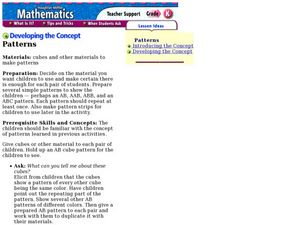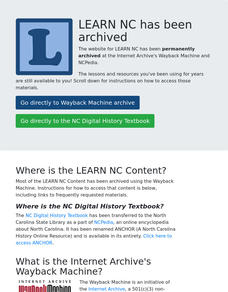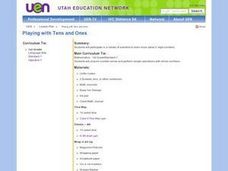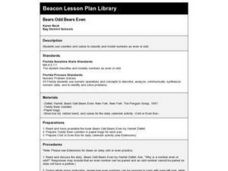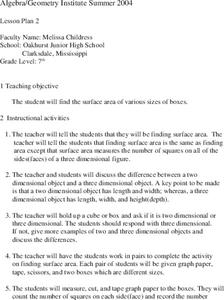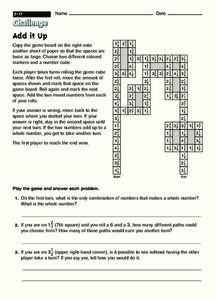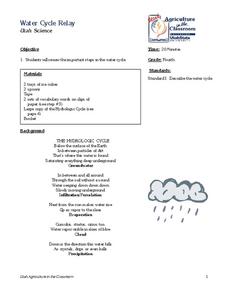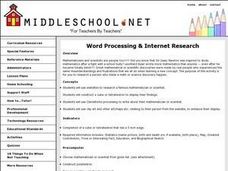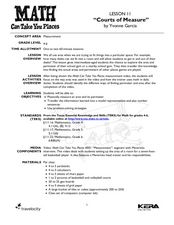Curated OER
Developing the Concept: Patterns
Students understand what a pattern is and how to make a pattern. In this pattern instructional activity, students use cubes to create various patterns. Students recognize the pattern created.
Curated OER
Number: Index Notation
Students explore the concept of index notation. In this square root and cube root lesson, students examine number patterns as they complete a worksheet that requires them to calculate roots.
Curated OER
Probability
Students complete various activities for probability. In this probability lesson plan, students use coins, cubes, peanut butter and jelly, playing cards, number cubes, darts, and a Gauss Curve to study probability. Students must orally...
Curated OER
Measure Mania
Students measure their own silhouette using Unifix cubes. They measure a drawing using non-standard measurement. They swap drawings and compare their measurements.
Curated OER
Prime and Composite Numbers
Fifth graders use prime factorization to identify prime and composite numbers. They use cubes to find factors. In groups, 5th graders draw rectangular arrays to discover prime numbers under 100.
Curated OER
Playing with Tens and Ones
First graders complete a number of activities that increase their number sense and use of simple operations. They use dice and worksheets to make two-digit numbers and to record them, they count by tens and ones, and order numbers using...
Curated OER
Roll Me Some Factors
in this factors game worksheet, students follow a set of instructions to play a factors game, then answer 2 related questions. A reference web site is given for additional activities.
Curated OER
Bears Odd Bears Even
Students listen to a read aloud of Harriet Ziefert's Bears Odd Bears Even. They count cubes and counters to classify and show numbers as odd or even.
Curated OER
To Be (Half) Or Not To Be (Half)
First graders demonstrate various ways to represent and verify a whole or set separated in two, three, or four equal parts. Using interlocking cubes, Students model a part of a whole or a part of a set. They use appropriate tools and...
Curated OER
What's My Structure
Fourth graders use the language of mathematics to describe in words a 3-D structure created with one-inch cube. They interpret a written description of a 3-D structure and re-create it with one-inch cubes. Students use Quick Time...
Curated OER
Carrying to Tens
in this addition worksheet, students read about carrying tens, then complete 13 problems, circling cubes as directed and solving. A website reference is given for additional activities.
Curated OER
Exercise in Perspective
In this exercise in perspectives, students are required to analyze a topic by completing six different activities. Students can work in groups, pairs or independently to complete the activity.
Curated OER
Surface Area to Volume Ratio
Students examine the surface area to volume ratio and how they relate. For this surface area lesson students complete several activities.
Curated OER
Calculating Volume
Students evaluate mathematical problems using the formulas for volume. They recognize "perspective" in different shapes including cubes, pyramids and cylinders. Students practice on brainstorming all the different shapes and how they can...
Curated OER
Surface Area
Seventh graders explore surface area. They study the difference between two and three-dimensional objects. The teacher leads a discussion about finding the surface area of different size cubes. In pairs, 7th graders use graph paper to...
Curated OER
Pressure Melting of Ice: While-U-Wait
Students demonstrates one of the few cases in which geologic solids visibly deform at room conditions. They suspend a weight on a thin wire over an ice cube to observe its effects over time.
Curated OER
Estimating Sums and Differences
In this math worksheet, students learn to estimate sums and differences by completing step by step exercises. There is one word problem which is the example, and then students can choose from other estimation activities to do with a...
Curated OER
Add it Up
In this fraction activity worksheet, students play a game that require them to add using fractions and mixed numbers. Students respond to 3 questions regarding the problem solving skills used in the game as well.
Curated OER
Water Cycle Relay
Fourth graders study the water cycle in nature. In this water cycle lesson, 4th graders review the hydrologic cycle by reading the poem. Students then study a picture of the hydrologic cycle and fill in the blanks with the missing...
Curated OER
Introduction to Digestion: What Happens to a Hamburger?
Students explore the human body by analyzing how food is absorbed. In this food digestion lesson, students utilize health vocabulary terms by participating in a guessing game activity. Students discuss their own eating habits and conduct...
Curated OER
Happy Birthday Mathematicians and Me
Middle schoolers choose a mathematician or scientist born on the same day as the student and research them. They create a cube or tetrahedron and place required information on the sides (such as birth year, death yr., greatest...
Curated OER
Integrating Mathematics Into Literature
Students discuss tables, multiples, fractions, ratios, and probability while participating in daily activities in this cross-curricular Math lesson using examples from Literature. State standards in Mathematics are addressed over the...
Curated OER
Courts of Measure
Students practice their area and perimeter measurement. For this measurement lesson, students watch a video about perimeter and area. Students measure a gym for perimeter and area. Students write number sentences for the area and...
Curated OER
Two-Dimensional Drawings from Three Dimensional Objects
Sixth graders identify and replicate two dimensional illustrations of three dimensional objects. In this spatial visualization lesson, 6th graders practice viewing objects from various sides. Student participate in stations to view...
Other popular searches
- Writing Cubing Activities
- Cubing Activities English
- Cubing Activities as Review
- Cubing Activities in Health


